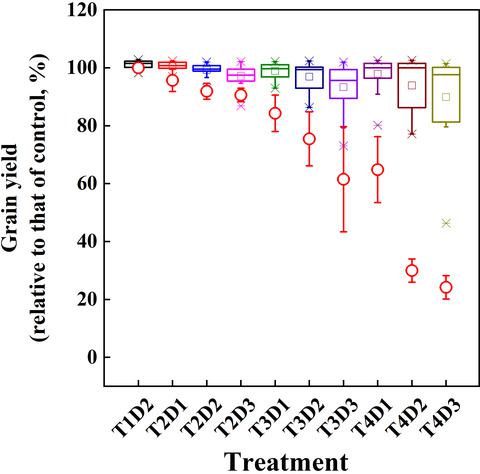当前位置:
X-MOL 学术
›
Glob. Change Biol.
›
论文详情
Our official English website, www.x-mol.net, welcomes your
feedback! (Note: you will need to create a separate account there.)
Current rice models underestimate yield losses from short‐term heat stresses
Global Change Biology ( IF 10.8 ) Pub Date : 2020-10-16 , DOI: 10.1111/gcb.15393 Ting Sun 1 , Toshihiro Hasegawa 2 , Bing Liu 1 , Liang Tang 1 , Leilei Liu 1 , Weixing Cao 1 , Yan Zhu 1
Global Change Biology ( IF 10.8 ) Pub Date : 2020-10-16 , DOI: 10.1111/gcb.15393 Ting Sun 1 , Toshihiro Hasegawa 2 , Bing Liu 1 , Liang Tang 1 , Leilei Liu 1 , Weixing Cao 1 , Yan Zhu 1
Affiliation

|
Crop production will likely face enormous challenges against the occurrences of extreme climatic events projected under future climate change. Heat waves that occur at critical stages of the reproductive phase have detrimental impacts on the grain yield formation of rice (Oryza sativa). Accurate estimates of these impacts are essential to evaluate the effects of climate change on rice. However, the accuracy of these predictions by crop models has not been extensively tested. In this study, we evaluated 14 rice growth models against four year phytotron experiments with four levels of heat treatments imposed at different times after flowering. We found that all models greatly underestimated the negative effects of heat on grain yield, suggesting that yield projections with these models do not reflect food shocks that may occur under short‐term extreme heat stress (SEHS). As a result, crop model ensembles do not help to provide accurate estimates of grain yield under heat stress. We examined the functions of grain‐setting rate response to temperature (TRF_GS) used in eight models and showed that adjusting the effective periods of TRF_GS improved the model performance, especially for models simulating accumulative daily temperature effects. For TRF_GS which uses daily maximum temperature averaged for the effective period, the models provided better grain yield estimates by using maximum temperatures averaged only when daily maximum temperatures exceeded the base temperature (Tbase). An alternative method based on heating‐degree days and stage‐dependent heat sensitivity parameters further decreased the prediction uncertainty of grain yield under heat stress, where stage‐dependent heat sensitivity was more important than heat dose for model improvement under SEHS. These results suggest the limitation of the applicability of existing rice models to variable climatic conditions and the urgent need for an alternative grain‐setting function accounting for the stage‐dependent heat sensitivity.
中文翻译:

当前的水稻模型低估了短期热胁迫造成的产量损失
应对未来气候变化带来的极端气候事件的发生,作物生产将面临巨大的挑战。发生在生殖阶段的关键阶段热浪对谷物产量形成水稻的有害影响(稻)。对这些影响的准确估算对于评估气候变化对水稻的影响至关重要。但是,尚未通过农作物模型对这些预测的准确性进行测试。在这项研究中,我们针对四年的光电子实验对14种水稻生长模型进行了评估,并在开花后的不同时间进行了四个水平的热处理。我们发现所有模型都大大低估了热量对谷物产量的负面影响,这表明这些模型的产量预测并未反映短期极端高温胁迫(SEHS)下可能发生的食物冲击。结果,农作物模型集成不能帮助提供热胁迫下谷物产量的准确估算。我们检查了八个模型中使用的结实速率对温度的响应(TRF_GS)的功能,结果表明,调整TRF_GS的有效期可以改善模型性能,特别是对于模拟日累积温度效应的模型。对于使用有效期内每日平均最高温度的TRF_GS,仅当每日最高温度超过基本温度时,这些模型通过使用平均最高温度才能提供更好的谷物产量估算(T base)。基于加热度数天数和阶段依赖的热敏感性参数的另一种方法进一步降低了热应力下谷物产量的预测不确定性,在SEHS下,阶段依赖的热敏感性比热剂量更重要。这些结果表明,现有稻米模型在气候条件可变的情况下的适用性受到限制,并且迫切需要考虑谷物依赖于阶段的热敏感性的替代谷物设定功能。
更新日期:2020-12-15
中文翻译:

当前的水稻模型低估了短期热胁迫造成的产量损失
应对未来气候变化带来的极端气候事件的发生,作物生产将面临巨大的挑战。发生在生殖阶段的关键阶段热浪对谷物产量形成水稻的有害影响(稻)。对这些影响的准确估算对于评估气候变化对水稻的影响至关重要。但是,尚未通过农作物模型对这些预测的准确性进行测试。在这项研究中,我们针对四年的光电子实验对14种水稻生长模型进行了评估,并在开花后的不同时间进行了四个水平的热处理。我们发现所有模型都大大低估了热量对谷物产量的负面影响,这表明这些模型的产量预测并未反映短期极端高温胁迫(SEHS)下可能发生的食物冲击。结果,农作物模型集成不能帮助提供热胁迫下谷物产量的准确估算。我们检查了八个模型中使用的结实速率对温度的响应(TRF_GS)的功能,结果表明,调整TRF_GS的有效期可以改善模型性能,特别是对于模拟日累积温度效应的模型。对于使用有效期内每日平均最高温度的TRF_GS,仅当每日最高温度超过基本温度时,这些模型通过使用平均最高温度才能提供更好的谷物产量估算(T base)。基于加热度数天数和阶段依赖的热敏感性参数的另一种方法进一步降低了热应力下谷物产量的预测不确定性,在SEHS下,阶段依赖的热敏感性比热剂量更重要。这些结果表明,现有稻米模型在气候条件可变的情况下的适用性受到限制,并且迫切需要考虑谷物依赖于阶段的热敏感性的替代谷物设定功能。











































 京公网安备 11010802027423号
京公网安备 11010802027423号